The post Low key Meaning – Learn Definition, Usages, and Examples first appeared on www.airdroid.com.
]]>Some words have become really important in the evolving world of language and communication. One of those common expressions that have taken its way and established a presence in everyday speech across the internet and online interactions is "low key."
In this context, we will enlighten you on "low key" meaning, its term's history, and what it means in text and applications, and even look at its opposite, "high key," as we set out to uncover its many layers of significance. Let's get started.
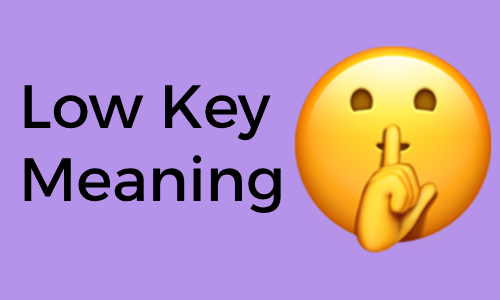
What Does Low Key Mean
"Low key" refers to behaving or acting in a subtly understated way, expressing one's desires or actions implicitly and preferably without drawing attention.
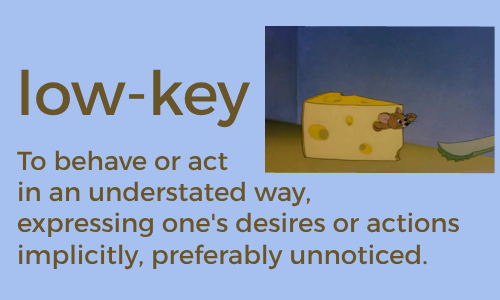
Suppose you want to effectively reduce the impact of remarks or where someone wants to project a casual or laid-back demeanor. In that case, the word usually flourishes in this type of situation.
Low-key brings a degree of restraint or prudence into the conversation as it takes on the function of caution. This dynamic ability of different interpretations turns low key a tool that encourages and communicates active participation from viewers.
Where Did Low Key Come From
The low key definition roots deep into African American Vernacular English (AAVE) soil, where its earliest incarnation emerged as a beacon of calm and unassuming demeanor.
Low key became a favored term for harnessing the power of brevity and relatability to forge connections across diverse audiences and for expression in online discussions, social media interactions, and informal exchanges.
Where linguistic innovation and adaptation thrive, "low key" seamlessly integrated into the evolving tapestry of internet culture in this transformation. To become a shared means of expression in the global digital village, it journeyed from a modest descriptor in AAVE to a widely recognized and embraced slang term epitomizing the dynamic nature of language, highlighting its capacity to transcend geographical and cultural boundaries.
Common Usage Scenarios of Low Key
The common area where "low-key" thrives is talking about one's likes and passions. Without overwhelming the audience, people can express their true emotions making it a vehicle for sincerity.
For instance, stating, "I lowkey love that song," injects a sense of intimacy and vulnerability into the conversation, fostering a meaningful connection by revealing a gentler element of the speaker's personality.
Examples of Low Key in Sentences
The seamless incorporation of "low key" into various contexts shows how adaptable it is as a linguistic tool. It brings the speaker's feelings and thoughts to the listener's open ears sine "low key" acts as a conduit in these typical usage settings. Here are some examples of low key in sentences:
"I'm lowkey excited for a quiet weekend at home, just need some time to relax," you might say.
"She's an artist and she has a little talent; you should see her artwork, it's really beautiful."
"His humor is a sneaky weapon; his jokes are always subtly funny, catching you off guard and leaving you in stitches."
By incorporating nuance, authenticity, and relatability into the exchange, the word "low key" serves as a linguistic amplifier, increasing the texture of the discourse in these instances.
Comparison with Other Related Phrases - Highkey
While low key thrives in subtlety and understatement, high key operates in a realm of amplified intensity and openness.
High key serves as the vehicle for unrestrained enthusiasm, openly showcasing strong emotions or opinions. It functions as a spotlight, directing attention toward the speaker's enthusiasm or conviction.
For instance, when someone exclaims, "I'm highkey obsessed with this show," they express their deep attachment and invite others to share their excitement.
Parenting Tips: Should Parents Worry about Ever-Evolving Slang Terms
The term low key in social media appears every day, and while it doesn't have unintended consequences or indecent implications, not all slang is so innocuous.
As the internet and social style innovations change how children and youngsters communicate and relate with each other, this really increases parents’ worries. The constant increase and change of internet slang have gone wildfire which has raised important concerns on how it affects children's language use and their digital experiences as it also reflects the fast speed of linguistics progress of the children.
When it comes to issues like this, especially on parenting on ethical internet use, AirDroid Parental Control offers a reassuring response. Thanks to its message notification and monitoring capabilities, this app helps parents keep in check on whatever their children are doing online while ensuring their digital safety.
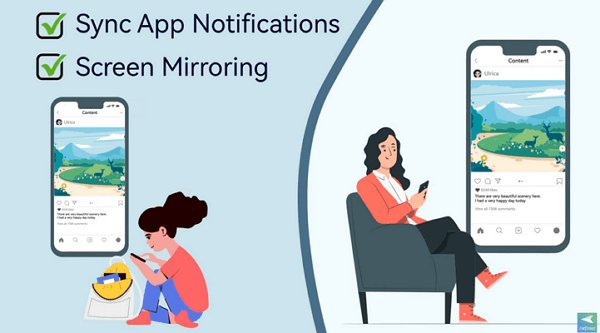
With AirDroid Parental Control, parents can:
- Syncing your child's notification sync in the app
- Screen mirroring your kid's phone to check their real-time usage
- Getting keyword alerts when your kids search for inappropriate words
- Setting screen and app usage limits
AirDroid Parental Control achieves a careful balance between encouraging digital exploration and protecting against potential threats by allowing parents to monitor their child's online activity. Also, open discussions about language, slang, and digital responsibility can be fostered by parents as they participate in their child's online experience.
Conclusion
Having gone through this content, we hope you have been enlightened on the meaning of "low key," how it can be used, and how it has gone viral over the years with the aid of social media platforms.
Low key in social media is more than just slang. It reflects the constant evolution and innovation of everyday communication and social networking. AirDroid Parental Control helps parents close the generational division while promoting responsible technology use and open communication.
The post Low key Meaning – Learn Definition, Usages, and Examples first appeared on www.airdroid.com.
]]>The post What Does BMS Mean? Decoding Its Meaning and Usages first appeared on www.airdroid.com.
]]>What Does BMS Mean
BMS is an acronym that stands for "Broke My Scale". It is commonly used on social media platforms and in text messages. The term is primarily used as a compliment, indicating that someone is so attractive or impressive that they've "broken the scale" typically used to measure these qualities. In other words, they've surpassed the usual limits of attractiveness or impressiveness.

- AirDroid Parental Control & Text Monitoring
- Monitor online activity by mirroring kids' phones and syncing text messages & app notifications
- Find your loved ones in real-time and set geofencing; see and hear their mobile surroundings remotely
- Schedule how long and when your kids can use their mobile and manage app usage
Origin of BMS
The exact origin of BMS is unclear, as is the case with many internet slangs. However, it's generally agreed that BMS originated from social media platforms where users rate each other's pictures or posts. The term started gaining popularity on platforms such as Instagram, Snapchat, and Twitter, where users often post photos of themselves or others. When a user comments "BMS" on a post, it signifies that the person or thing in the post is so attractive or impressive that it surpasses the conventional rating scale.
Use Cases of BMS
BMS is commonly used in social media interactions, particularly where rating or complimenting someone's appearance or achievements is involved. Here are a few examples of how it can be used:
In comments on social media posts: A user might comment "BMS" on a picture of a friend who looks particularly attractive in the photo. This implies that the friend is so attractive that they've broken the conventional attractiveness scale.
In text messages or chats: If someone sends a picture or tells a story about an impressive achievement, the recipient might respond with "BMS" to indicate that the sender has surpassed expectations.
In online games or forums: Users might use "BMS" to compliment other players on their skills or achievements in the game. For example, if a player performs an impressive move or strategy, another player might comment "BMS".
Other Meaning of BMS
Apart from the common usage, the acronym "BMS" has several other meanings depending on the context:
Bachelor of Management Studies: An undergraduate program for management studies offered by many universities.
Building Management System: A control system installed in buildings to manage and monitor equipment such as ventilation, lighting, power systems, fire systems, and security systems.
Battery Management System: A system in electric vehicles and other battery-powered devices that manages a rechargeable battery (cell or battery pack), such as by protecting the battery from operating outside its Safe Operating Area, monitoring its state, calculating secondary data, reporting that data, controlling its environment, authenticating it and / or balancing it.
Bristol Myers Squibb: An American multinational pharmaceutical company, among the world's largest.
Business Management System: A tool for strategic implementation and management of practices, processes, and procedures within an organization.
Please note that the meaning of BMS can vary widely depending on the field and context it is used in.
How to Identify if Your Kids Use This Slang: BMS
As a parent, it's important to be aware of the slang terms your kids are using, especially those used online. Here are some tips on how to identify if your kids are using the slang term "BMS":
- Monitor their social media interaction: Check the comments they're leaving on others' posts and the comments they're receiving. If you see "BMS" frequently, they're using the term.
- Observe their text messages: If you notice "BMS" in their text messages, it means they're using the term.
- Open communication: Ask them about the slang terms they use. This encourages open communication and gives them a chance to explain the terms to you.
- Use online resources: There are numerous online resources that explain internet slang. If you come across a term you don't understand, look it up.
- Use a parental control app: AirDroid Parental Control is a powerful and comprehensive app designed to help parents monitor and manage their children's online activities.
AirDroid Parental Control is an essential tool in today's digital age, where children are growing up amidst a variety of online platforms and digital influences. The primary feature of AirDroid Parental Control is its ability to sync and monitor all the received messages on your kid's phone. This means that, as a parent, you can keep track of who your child is interacting with and what kind of conversations they are having. This can be particularly useful in identifying if your kids are using slang or language that you may not understand, such as 'BMS'.
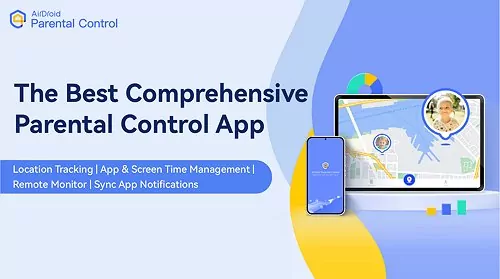
Moreover, the app offers a range of other features, including app management, screen time control, and location tracking. This allows parents to not only monitor their child's digital interactions but also manage their digital wellbeing and safety.
In the context of this guide, AirDroid Parental Control can be an invaluable tool in helping you identify if your kids are using slang like 'BMS'. By syncing with your child's messages, you can keep an eye on their conversations and step in if needed. This ensures that you are not left in the dark about what your child is saying or who they are talking to, providing a level of oversight that can help maintain their online safety.
Wrapping Up
In conclusion, understanding internet slang like BMS can help you stay updated with the changing dynamics of digital communication. It's essential for parents to keep up with these terms to better understand and communicate with their kids in this digital age.
The post What Does BMS Mean? Decoding Its Meaning and Usages first appeared on www.airdroid.com.
]]>The post Simp Meaning: What Does Simp Mean first appeared on www.airdroid.com.
]]>We live in an era where social media and gaming platforms attract billions of people, and slang terms are common within these platforms. Internet has it all, From simple terms like WTF and OMG to much more complex and elaborative terms like simp.
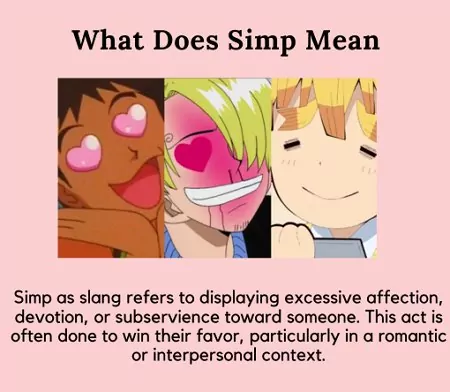
The term "simp" has captured the attention of millions across online communities, social media platforms, and gaming circles. Originally derived from the word "simpleton," which denotes a foolish or gullible person, the contemporary usage of simp has taken on a distinct and controversial meaning, particularly when it comes to affection and devotion.
What is simp meaning, or what does simp mean in our current modern society? Well, let's have a look.
Simp Definition
Simp can either be a verb or a noun depending on the context in which it is used. But does simp meaning change when it is either a verb or a noun? Well, not exactly. The term simp will still have the same core meaning; however, it may differ slightly. So, let's define simp in all contexts.
Simp Meaning
Simp as a slang refers to the act of displaying excessive affection, devotion, or subservience toward someone. This act is often done to win their favour, particularly in a romantic or interpersonal context. In other words, we call this simping.
When someone is simping for another person, they go to great lengths to please or impress them, sometimes at the expense of their own self-respect or well-being. This behaviour is typically seen as being motivated by a desire for attention, validation, or a chance at a romantic relationship.
The term "simp" as a verb is commonly used in a pejorative sense, often by internet users and within specific social circles, to criticize or mock individuals who engage in such behaviour. It can imply that the person is being overly naive, desperate, or lacking self-confidence.
Simping Meaning
Simping is as noted above. This term is used to describe the act of showing excessive affection, admiration, or devotion towards someone. Simping aims to gain the girl's attention or love in return.
You might have come across this term online. Now you know, it's all about going overboard with affection, admiration, or devotion towards someone, hoping they'll notice you or like you back.
At first, it might seem like a genuine way to show interest, but it's gotten a bit of a bad representation in certain situations. For example, the girl or boy you're after might be pushed away with you simping.
Furthermore, people might use it to tease or criticize those who seem too eager or desperate to win someone's favour.
What Is Simp in Love
A simp in love typically refers to a person who displays excessive and often unreciprocated affection, adoration, or devotion towards someone they are romantically interested in. A simp in love might engage in various actions, such as:
- Constantly complimenting the person
- Showering them with gifts
- Always being available for them even when they do you badly or after ghosting you, or
- Bending over backward to accommodate their every need
Honestly, these actions can be considered genuine expressions of affection, which is good. However, these behaviours become problematic when it borders on being overly desperate or submissive, leading to a lack of self-respect or neglect of one's own needs and boundaries.
What Is a Simp?
A simp refers to a person, typically a man, who is perceived as a "simping" individual.

In this context, calling someone a "simp" suggests that they regularly exhibit the behaviours associated with the verb form of the term. The label can be used both in a derogatory manner, intending to belittle or shame the person, or it can be used as a light-hearted joke among friends to tease someone about their romantic interests.
Simp Meaning for Girl
A girl can consider a boy that is simping a simp. But is that all when it comes to girls?
Well, no.
It is essential to note that the term simp is not inherently gender-specific. Therefore, it can be used to describe both men and women who exhibit the behaviour associated with it.
This means a girl or woman who displays excessive affection, admiration, or devotion towards someone she is romantically interested in can also be referred to as a simp.
What Does Simp Mean for a Boy
For a boy, a simp can be another boy going over and beyond to impress a girl and gain her attention.
Additionally, a girl who shows abundant affection, admiration, or devotion towards someone she is romantically interested in may also be labelled as a simp.
What Does It Mean to Be a Simp
I think we already now know what the term simp means. So, I will make it simple to answer this question:
To be a simp means to be overly desperate towards another person to get their attention and affection.
Where Does Simp Come From?
The term "simp" has a fascinating history and transformation. Initially derived from "simpleton," meaning a foolish or gullible person in the early 20th century, it gradually took on new connotations.
In the 1980s and 1990s, within hip-hop and rap culture, particularly in the African American community, "simp" was described as a man excessively obsessed with or subservient to women. It carried negative implications, suggesting weakness or vulnerability in relationships.
With the rise of the internet and social media in the 2010s, "simp" experienced a resurgence. Online communities, especially on platforms like Reddit and Twitter, popularized the term and used it to mock men deemed overly devoted or supportive of women, often without receiving reciprocity.
As a result, "simp" has become a divisive term, used both playfully among friends and as a derogatory label to shame individuals for their behaviour in relationships.
Language and slang continually evolve, and "simp" serves as an example of how words can change in meaning and context over time, reflecting shifts in cultural and social norms.
How Is the Slang Simp Used in the Conversation?
A simp can be used in several ways, such as:
Insulting Someone's Behavior:
In a conversation, someone might use "simp" as an insult to criticize or mock another person's behaviour, especially if they perceive that person to be excessively lovely or affectionate towards someone, they have feelings for.
For example:
- Mark: Did you see John showering Sarah with expensive gifts again? He's such a simp.
- Brian: Yeah, he's always trying so hard to impress her. It's embarrassing.
Self-Deprecation or Humor:
Sometimes, people use the term simp in a self-deprecating or humorous manner to playfully acknowledge their own romantic or affectionate gestures. It's a way of showing awareness without taking the term too seriously.
For example:
- Me: I bought her flowers, wrote her a poem, and still got rejected. I'm the biggest simp out here.
- You: Haha, don't worry, we've all been there at some point.
In Online Memes and Comments:
Simp is commonly used in internet memes, comments, and social media to make fun of situations where someone is going to great lengths to please someone they're attracted to, often without receiving much in return. It is typically used light-heartedly and not necessarily directed at anyone specific.
For example:
- "When you find out they like vegan food, so you become a vegan too. *simp mode activated*"
Addressing Disagreements:
Some people might use simp to dismiss someone's opinions or actions as influenced solely by their romantic interest in a particular person or group. It can be a way of invalidating their viewpoints by suggesting they are biased. This is quite common among close friends or so.
For example:
- My Brother: I think Taylor Swift's new song is incredible!
- Me: You only like it because you're a simp for Taylor Swift.
Who Uses Simp?
While it is a common term among young groups, particularly millennials and Gen Z, this slang term can still be used by anyone.
Is a Simp a Bad Thing?
Well, to some extent, yes. Let's look at it this way; simp can be a bad thing in ways such as:
- Shaming healthy relationships
- Stereotyping affection and kindness
- Promoting toxic masculinity
- Encouraging misogyny
- Undermining empathy and compassion
- Judging personal relationships
- Fostering negative peer pressure
- Contributing to cyberbullying and online harassment
This is when the term is used. However, the other question is, is being a simp bad? – NO or YES. In simple terms, it depends.
For example, some ladies or girls don't really like men they can easily work all over them. The guys that try too hard despite not receiving positive feedback from them. So, you see! Balance and self-respect are everything.
How to Determine Whether Your Kid Is a Simp
There are several ways to do this:
- Ask them: Don't just go direct to the point like, are you a simp. Just ask them in other better ways, like knowing how they are approaching a specific girl, what he has done to convince her and what he is willing to do to get her. If it happens, he or she is showcasing the above symptoms; then your kid is a simp or about to be.
- Check their conversation: Most kids nowadays interact via mobile devices and on their social platforms. So, keep track of their conversation to discover whether they are simp.
To do this, you can either go through their mobile devices directly, which might not deliver 100% results because they might delete once they know you can go through their phone. Therefore, the best way is to use parental control app such as the AirDroid Parental Control app.
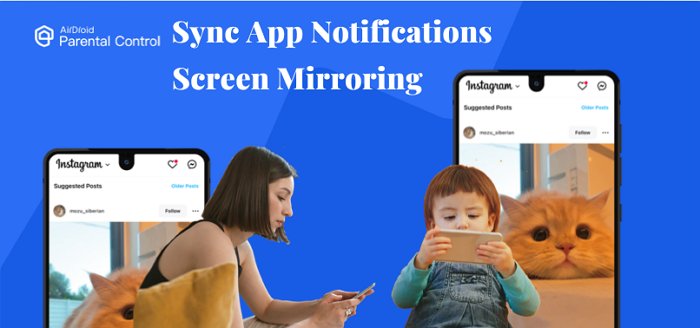
This app can help you have full access to messages from all social platforms in real-time. In addition, it offers other benefits like Tracking location, app and screen time management, remotely safety monitoring, and several other benefits.
Conclusion
Overall, it is safe to say the term simp has taken on several meanings in today's internet-driven culture. Originally derived from "simpleton" to describe a foolish person, simp meaning has evolved over the decades to encompass individuals who display excessive affection, admiration, or devotion towards someone they are romantically interested in.
While the term can be used playfully among friends, it has also acquired a negative connotation, often used to shame or mock those perceived to be overly devoted in relationships.
The post Simp Meaning: What Does Simp Mean first appeared on www.airdroid.com.
]]>The post What Does WTF Mean? Discover WTF Meaning and Usage Here first appeared on www.airdroid.com.
]]>Hey there! Have you ever encountered the acronym "WTF" in a text message, social media post, or online forum and wondered, "What does WTF mean?" Don't worry; you're not alone!
Social media platforms and online communication mainly drive today's world. And so because of this, the use of acronyms and shorthand phrases has increased tremendously, making it tough to keep up with all of them; thus, not knowing any new slang word shouldn't become a concern.
To help with this, we have been defining these slang words in our articles dedicated to this. To make it even better, we go as deep and explain how it is used in conversations and different contents to help you better understand it.
Therefore, today we're going to break down the meaning of WTF and explore its origins and usage so that you can confidently navigate through online conversations without any confusion. With that said, let's get started!
WTF Meaning
WTF Meaning in Chat
The acronym "WTF" stands for "What The Fuck". This expression is used mainly by people to convey surprise, confusion, shock, disbelief, or frustration. For example, when something unexpected or absurd happens, you can use it as a response.

However, it is essential to note that this phrase is often considered vulgar and offensive. This consideration is mainly due to its profanity use. Furthermore, it is typically inappropriate to use in formal settings or when conversing with a person or people you don't know well.
Overall, the WTF phrase has become increasingly prevalent in informal online conversations and social media posts. People in online discussions tend to express their feelings more casually and relaxedly.
What Does WTF Mean Sexually?
While you can use the "WTF" phrase in a sexually suggestive or explicit manner, the fact remains that the sexual connotation associated with this phrase isn't its primary meaning. As noted, "WTF" generally expresses shock, surprise, confusion, or disbelief. But the question here is; can it be used sexually?
The answer to this is YES. However, it all depends on the context and tone of the conversation: But how?
Well, let's take a look at several examples to explain this.
- "WTF, man!!! Look at her fine A**." – This sentence is used to sexually describe how a woman 'behind' looks fine* but in a shocking way.
- "Like WTF!!! You mean you both kissed?" – In this case, the speaker is surprised by their kissing. Of course, it expresses surprise or disbelief within a sexual context.
And that's it. As you can see, it doesn't have a direct meaning sexually but can be used within a sexual context.
However, there is a not-so-common term, "WTFsexual which some people use." WTFsexuality is a type of sexual arousal characterized by an attraction to unconventional objects or situations that are not typically arousing. It can include anything from tentacles and spoons to the Holocaust. It does not include items such as forks or sporks. WTFsexuals mostly have a lower interest in traditional sexual activities and a greater interest in the unusual. Here is an excellent example of this term from the urban dictionary:
- "I don't like your penis. Can you make it a Tentacle? I'm WTFsexual."
Other Meanings of WTF
Even though "WTF" mainly stands for "What The F***," it can also feature other less common alternative meanings. These alternatives' WTF definitions depend on the context of the phrase. Here are some of the alternative meanings of "WTF":
- "Welcome to Facebook" – This meaning is often used to welcome someone to Facebook or other social media platforms.
- "Why The Face?" – This meaning is often used humorously or sarcastically to ask someone why they look upset or bothered.
- "Who's That Freak?" – This meaning is often used derogatory or insulting to describe someone seen as strange or weird.
- "Well, That's Fantastic" – This meaning is often used sarcastically to express the opposite sentiment of something that is not fantastic.
- "Where's The Food?" – This meaning is often used in the context of hunger or a desire for food.
Remember that these alternates WTF meanings are far less common than the primary meaning. Also, these meanings are often used humorously or sarcastically.
In general, the actual meaning of "WTF" used within any conversation can only be determined by the context in which it is used.
How Is WTF Used in Conversations?
Well, depending on the context and tone of the conversation, "WTF" can be used in various ways. Therefore, this makes this phrase a versatile acronym like several other acronyms, such as 'OMG.' So, what are the most common ways "WTF" is used in conversation? Let's have a look:
Express shock or surprise
One of the most common ways we use the phrase "WTF" is to express shock or surprise. In this case, the term is mainly used to respond to something unexpected or absurd.
Examples:
- "WTF?! I can't believe he said that!"
- "WTF! Did you see that car crash? That was insane!"
- "WTF! I can't believe my favorite show just got cancelled."
- "WTF! I just found out my ex is dating my best friend."
Express frustration or annoyance
When you are frustrated or annoyed by something, you can use WTF to show it. Most people in a difficult or frustrating situation react with this word to vent their frustration automatically.
Examples:
- "WTF! Why won't this website load?"
- "WTF! Why won't this computer stop freezing?"
- "WTF! This traffic is ridiculous. I'm going to be late for my meeting."
- "WTF! Why won't my phone charge? This is so annoying."
Express humor or sarcasm
When something quite ridiculous happens or is said, you can also use WTF as part of your response. WTF is used humorously or sarcastically in such a situation to comment on something.
Examples:
- "WTF! That's the best excuse you could come up with?"
- "WTF! Did you wear socks with sandals? Fashion icon alert!"
- "WTF! You're telling me you're a professional Fortnite player? Yeah, right!"
- "WTF! You're really going to eat that entire pizza by yourself? That's impressive."
Now that you know WTF meaning and how it is used in conversation, let's now determine whether this phrase is a bad word.
Is WTF a Bad Word?
Well, the short answer to this open question is YES. Generally, "WTF" is considered a bad word to use in conversation in most cases, mainly formal conversations or when conversing with a person or people you don't know well. This slang term uses profanity, and many people find it entirely inappropriate in specific settings or, to make it worse, offensive.
But that being said, it's vital to remember that language is constantly evolving. It means that certain phrases can evolve from being disliked to being more liked (accepted) by society.
For example, OG may have been considered unacceptable due to its relation to violence and drags. Still, as of now, it has become more widely accepted in conversation. Additionally, the acceptability of a particular language can vary depending on several things, such as the context and audience using it.
For instance, if you're in a casual or informal setting with friends who like using vulgar language to spice up conversations, then "WTF" will be ok. Nevertheless, you are in a more professional or formal setting. In that case, using slang words that are considered vulgar could easily be seen as unprofessional, disrespectful, or even offensive.
Ultimately, it's up to you to decide whether or not to use "WTF" in your daily conversations. But you must know your audience and the context to avoid unnecessary setbacks.
How Can You Determine If Your Kid Is Using WTF Slang Word?
As noted, WTF is still considered by many to be vulgar and not ideal for use in professional settings. It means if your kids use them in places such as school can put them at risk of getting suspended. And so, how do you tell if your kid is using such slang words?
There are several ways, such as asking them or checking their messages. However, this might not bear desired results since your kids can lie to you or delete the conversation to hide it. So, the best way is to keep track of their conversation remotely without them noticing that.
To do this, you will need a parental control app; the best option will be the AirDroid Parental Control app. What makes it great is that it gives you detailed information about everything your kids are doing while on their mobile devices.

In addition, it comes with other super valuable features such as:
- Syncing app notifications
- Screen mirroring kid's Android devices
- Remotely watching, listening, or recording mobile surroundings
- App & screen time management
- Daily or weekly usage report
- Location tracking feature
To wrap It up
Overall, "WTF" is a versatile acronym that can be used in various ways in conversation. There are several WTF meanings, but the primary WTF definition is 'What The Fuck.' Whether you're expressing shock, confusion, frustration, or humor, "WTF" has become a popular and widely recognized term that helps convey emotions and reactions.
However, remember that "WTF" is a slang term considered vulgar and offensive by many people. While it may be acceptable in specific informal settings or with close friends, using "WTF" in more professional or formal settings could have negative consequences.
So, the next time you're considering using "WTF" in conversation, use it with a bit of caution.
The post What Does WTF Mean? Discover WTF Meaning and Usage Here first appeared on www.airdroid.com.
]]>The post BTS Meaning: What Does BTS Stand For first appeared on www.airdroid.com.
]]>BTS is one of many acronyms that have taken the internet by storm in the past decade. However, many of us need to learn what is 'BTS meaning.' And so, it begs the question, "What does BTS stand for?"
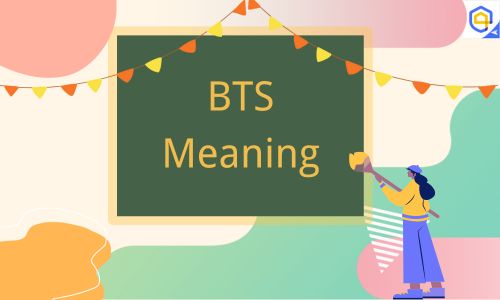
Well, as you might have noticed, our communications feature more acronyms in this social media era than ever. From simple ones like OMG, OG, and GTFO to more complex ones like BTS and Furry, there are lots of them.
And so, feeling confused and not knowing the meaning of any of these acronyms is a good thing since the internet and articles like these are to help you out. Therefore, this article will discuss What BTS stands for (3 common meanings) and how it is used.
With that said, let's get started!
What Does BTS Stand For
There are several meanings of BTS, but here we will discuss three standard definitions of BTS.
1Bulletproof Boy Scouts
BTS stands for "Bangtan Sonyeondan," which translates to "Bulletproof Boy Scouts" in English.
It was initially named "Bangtan Boys" but changed to "Beyond the Scene" in 2017 to represent their growth and progress beyond their original concept. They are well known as the BTS Army.
However, they still use the acronym BTS as their official name. BTS is a South Korean boy band formed in 2013, consisting of seven members: RM, Jin, Suga, J-Hope, Jimin, V, and Jungkook. The group has gained immense popularity worldwide for its music, choreography, and social activism.

2Behind The Scenes
Regarding the entertainment industry, BTS often stands for "Behind The Scenes," which refers to creating a film, TV show, or music video and includes everything that happens off-camera, such as rehearsals, set design, and costume fittings.
Usually, creators release BTS footage as a separate video or include it as bonus content on a DVD or Blu-ray release.

Additionally, when it comes to the internet and social media, BTS can also stand for "Beneath the Surface," which refers to the hidden or less visible aspects of a person's life or personality, such as their emotions, thoughts, and struggles.
It is often used to encourage people to look beyond someone's appearance or social media presence and to consider what they might be going through on a deeper level.
3Burn That Shit
Sometimes BTS can be used as slang to express "Burn That Shit." This derogatory and offensive term expresses a desire to destroy or eliminate something, often harmful or unwanted.
Is this slang term good, in any case?
Well, not exactly.
If used for fun, no problem, but when used in serious situations, such as threatening someone, it becomes terrible or dangerous.

Key Takeaways
Now that you know BTS meanings, it is essential to note that the first two meanings are self-explanatory and not derogative.
But when it comes to the third definition, things become more attractive. This term can be used in several ways in conversations, and this is an important note to take.
Before we discuss the third one in detail, it is essential to note that Behind the Scenes can also be misused. For example, when you want someone to help you do something illegal, then you can ask them:
· Let's get this done BTS or
· Let's meet up but BTS, ok?
Let's do this behind the scenes without anyone noticing it.
So, let's explain how you can use BTS (burn that shit) in conversations.
How BTS (Burn That Shit) Is Used in Conversations
There are several ways in which burn that shit can be used in conversation, such as:
Burn something unwanted
In most cases, the term shit is usually used to refer to something unwanted, for example, waste like papers, worn-out clothes, or other things.
Therefore, when you hear a person say burning shit or burn that shit, they might refer to burning these unwanted things. Real-life example:
Hey John, did you burn that shit I told you yesterday?
As a light-hearted joke or banter:
Using such slang terms as a joke is common in our age. So, burning that shit can be used as a way to joke with your friends or to banter with them in a friendly manner.
In this context, this phrase doesn't take its actual meaning but instead a nice joke like, for example, 'Kick your ass,' which may be a short phrase that you can also use playfully.
Threaten Someone
You have probably encountered someone using burn that shit phrase in this context, as it is one of the most common use cases for this phrase. For example:
· If you don't stop now, I will burn that shit down!
· If you don't get it done by noon, I will come over there and burn that shit down myself, and you won't like it!
From these examples, you can almost sense the speaker's tone. It also tells how enraged they are and that they will burn something if the person they speak to doesn't do what they are asking.
Smoke 'Weed'
Well, this is the unwanted but real-life use case of this phrase. Smokers tend to use this phrase when they are communicating with each other. For example:
Hey bro, I got lighter; let's burn that shit!
I haven't burned that shit in a while; I'm really craving it.
From these examples, you can also note that what is about to go down isn't good. The speaker asks their friend about smoking 'weed,' which isn't good if it happens to be your kid or friend saying that.
Is BTS (Burn That Shit) an Excellent Phrase to Use
We almost unanimously agree that burn that shit phrase isn't a good term to use in nearly every environment.
It is understandable when you joke with your friend or tell your kids to burn rubbish, but if you use it in the wrong context, it becomes a bad term.
When you use this term in the wrong place or wrong way, it can mean several things:
· That you use drugs, i.e., you smoke weed.
· That you are threatening or manipulating someone, which leads to you being charged.
· It can also show your unprofessionalism if you use it at work or in official conversations, groups, or chartrooms.
Therefore, being mindful of what terms you use in your conversation is essential to ensure you get everything right and create correct impressions in front of important people.
What if you're a parent? How can you tell if your kid is using such terms? Well, let's have a look.
How to Identify If Your Kids Are Using BTS in Their Conversations
There are three main ways that you can use to tell if your kids are using such terms that may put them in a problem or bas place. These ways include:
Ask Them
This straightforward step can give little insight into whether your kids use BTS or such terms.
However, this method means you are banking on the fact that your kids will be candid with you, which isn't the case in most cases. So, what do you do? Move on to option 2.
Check Their Phone Physically
Checking your kids' mobile devices is a better and more efficient alternative to asking them. It may not be 100% productive, but you will see more than you were looking for and understand your kid better.
If you notice that your kids are using such terms, have an honest conversation to remind them to use their words carefully.
This option also may not bear good results because your kid might delete bad discussions they might have had with friends. So, to navigate this issue, you can opt to option 3.
Use the Parental Control App
The AirDroid Parental Control app is the third and most ideal option since it will give you more detailed results of what your kids are up to when they are on their devices.
You will get to read all their conversations without them even noticing and, more importantly, get ahead of the game.
So, what is the best parental control app, especially for this?
Well, many parental control apps are out there, but our best pick is the AirDroid parental control app. Here are some of the key reasons to use this app:

- Instant notifications: get notified when they receive information on their mobile devices.
- Daily and Weekly report: You don't have to be on your phone 24/7 to monitor their conversation. All you need is to install the app and track their devices, and you will get all information relayed daily and weekly.
- Tracks everything: Unlike other parental control apps, AirDroid monitors all app activities, even the YouTube, Facebook, and Instagram videos they watch and how long they spend on each app.
- Affordable pricing: Besides these four reasons, this app offers additional features like location tracking, app and screen time management, and remote monitoring.
Conclusion
Slang and acronyms are the new and featured way of communication. So, knowing what they mean is essential. But just like BTS's meaning, some acronyms can feature more than one meaning; therefore, you should be aware of that.
The post BTS Meaning: What Does BTS Stand For first appeared on www.airdroid.com.
]]>The post Dope Meaning: Definition, Origin, Use Cases, and More first appeared on www.airdroid.com.
]]>Hello there! Have you ever come across the word dope in a text or even found yourself in a situation where someone used it in a conversation, and you did not know what to say? You are not alone.
As much as the use of the word dope is increasingly being used, especially among young people but never the less, there are many people with no clue as to what the word is all about.
Like seriously, what is dope? Is it an insult? A compliment? Something extremely rude? A joke? Or something that is deeply different from what we expect? Well, there is no need to worry about that because we have covered you.
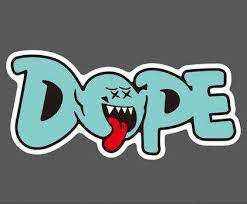
In this article, we will provide you with the meaning, synonyms, how we can use the word during a conversation, and, best of all, how to respond to it in a conversation.
With that, be ready to get started!
1What Does Dope Mean in Texting?
Dope is a slang phrase people use all the time, both in texting and virtual communication. We can use it to refer to not one but many things.
More importantly, it is a simple and cool way of saying something is very good or excellent – used to describe something as cool. It can also describe someone smart or even talented and something that one considers favourable.
Usually, replying with just one word in a conversation may be considered rude or not polite, but in this case, it is a playful way of conversing. Especially when used to praise something or someone.
2When Did the Word Dope Start to Be Used?
It isn't easy to know exactly when the word was first used, but it has been used for a long time to mean different things.
For instance, in the 1800s, it was used to refer to doop in Dutch, which meant 'Thick Sause,' and in the 1850s, as a mild insult to mean someone is incredibly stupid. Therefore, the word dope has come a long way.
Shockingly, in some cases, dope is even used to mean drugs or someone who has used drugs. It may also refer to drugs that some athletes take or even imply information known to only a small group of people.
3How Is the Phrase Dope Used?
The word dope is used in many and varying ways one can imagine, but more importantly or the most common meaning is the one below.
Describe How Cool Something Is
The slang phrase dope is often used to describe something, a person, or an exceptional or fantastic event. People mostly use it to express how they feel about someone or something. Teenagers mostly use it.
For example, one may say;
- Your brother is dope!
- That new mall is dope!
- The talent show we attended yesterday was dope!
Here are some other ways in which we can use the slang phrase. Please do not fail to look to them as they may benefit you once you know them.
Drugs Synonym
In some cases, the phrase has been used as a synonym for specific drugs. It may also be used as an in-name for overall drugs, where people can talk about drugs without actually Altering the word drugs.
Here are some examples to show how your teen can use the slang word dope to mean drugs in texting on in a conversation.
- He was kicked out of school for smoking dope.
- I will inform your parents if you don't stop doping.
Mean Silly or Stupid
A person may use dope to mean the other person is silly or stupid. In this scenario, the phrase connotes an insult and may indicate rudeness or lack of respect for someone. Here are some examples of how we can use the word in a sentence to mean stupid.
- Are you dope? You shouldn't have thrown away such nice shoes.
- Don't play with dirt, you dope!
Mean Information
We can also use the phrase dope to imply information, especially secret or hidden information. Below are some examples in sentences.
- The police dug up some dope that could incriminate him.
- The Newspaper revealed inside dope on fertilizer companies
Doping (Cheating in sports)
We can use dope to indicate giving a person or an animal drug to help them perform better or make them perform worse in a competition.
It is not news to you; you may have heard of Athletes being banned for doing this. Below is an example of how the word can be used in a sentence to bring out this meaning.
- The athlete was disqualified after failing to pass the dope test.
4Which Group of People Use the Word Dope?
Many people in different situations use the phrase dope for communication, while others try not to avoid it or don't use it at all. It is mostly used by young people, especially teenagers, to express themselves to others who understand the word.
Teens use the word to mean things like desirable or even people they deem awesome. They may also use the word to indicate other things that might not be ideal for them; hence, it is important to note how the word is used. And identify its meaning in different situations.
5How to Identify If Your Child Is Using the Dope Slang Word
Knowing the kind of slang words your child uses as a parent is very important. It is because as much as words like dope are mostly harmless, they may use it to cover up something bad like risky behavior or to talk with people who may be dangerous.
Here are some ways to know whether your kid is using the word dope.
Often Check What Your Child Does on the Internet
Some kids may have access to the internet. Such kids may be using slang words there without their parent's knowledge. If you often check what they do on the internet, you may come across words like dope or other words indicating that your child is using slang. You can do this with the help of parental control app.
Speak with Your Child and Find out from Them
If parents talk to their children and ask them directly whether they are using slang phrases like the word dope, in most cases, especially when there is no judgment and they are provided with a safe space, then the children are more likely to give genuine answers.
Take Keen of Your Child's Behavior
Children's use of slang phrases is often accompanied by behavioral changes depending on their slang words. It is, therefore, effective when you take keen of how your child behaves to identify the slang words they are using.
Make Sure You Pay Attention to the Language That Your Child Uses
It is very important to parents because you may be able to take note of suspicious or unusual phrases and be keen to ask them what they mean or even research them. These words may include words like 'dope.'
What Are the Best Parental Control Apps?
The parental control app that will blow your mind is the AirDroid Parental Control App. When this parental control app is installed on your child's phone will give you peace of mind as it will keep you informed about what your child is exposed to, including the risks that they encounter when using their phones or other devices.

Here are some of its brilliant importance.
- As a parent, you will be in a super good position to help your teenager to avoid the holes dug by predators, drug dealers, traffickers, or any other negative influences.
- It can give you control for you to be able to determine what is good for your child at all times.
- Understanding how your kid spends time connected to the internet is most important to you as a parent.
- It's also very helpful in knowing your child's physical location. It may enable you to determine whether they are where they should be at all times.
6Final Statement
In conclusion, the slang term "Dope" has a variety of meanings depending on the context.
It can be used to describe something as cool or awesome, as well as something unfavourable. We can also use it to describe a person or an object.
Regardless of how it is used, it is important to understand the context in which someone uses the word to ensure that the correct meaning is being conveyed.
The post Dope Meaning: Definition, Origin, Use Cases, and More first appeared on www.airdroid.com.
]]>The post NP Meaning, Origin, Use Cases, & More first appeared on www.airdroid.com.
]]>If you spend much time online chatting and love to do it, you might be familiar with the popular acronym 'np'. Or if not, then you might have received a text 'np' from the person when you thank them. Being a social media user, brace yourself for seeing it all the time. With innovative devices, the way of texting is also transforming.
In this article, you will find the exact meaning of the acronym 'np' and the phrase it represents. Here you will also learn about its origin and some alternative meaning. With this source, you will understand why these acronyms are becoming popular in online texting.
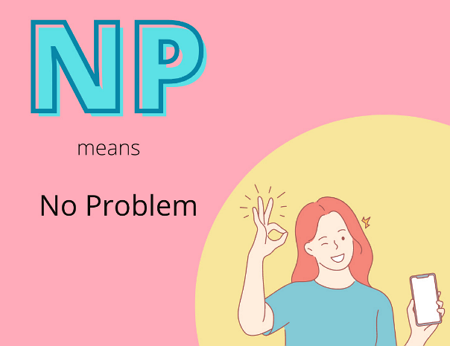
1What Does NP Mean?
The simple meaning of NP is 'No Problem'. This abbreviation is widely used in text-based messaging such as WhatsApp, Facebook, Instagram, etc. NP is usually used as a positive response to a text or to respond to someone without saying thank you.
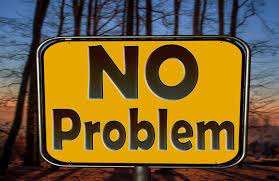
If you have chatted with someone online, they might have responded with the initialism of NP. Please keep reading to learn more about using it while chatting with your friends online.
2The History of NP
Just like many other acronyms, np emerged when chat rooms were new. At that time, people had limited screen space to text back others; hence, short common phrases were required to make conversation easier and snappier. So, this is how abbreviated terms such as 'np' became commonplace.
In Urban Dictionary, back in 2002, the oldest definition of np reads as No problem. It has been used long back to the 1980s, before even the advent of internet chat rooms. Since then, 'np' has become a popular acronym, and today it is being used by many people around the globe.
3How Is NP Used?
We can write the NP abbreviation in both uppercase NP and lowercase np. However, the lowercase variant is used more in personal messages.
On online platforms, while scrolling down your fingers, you are more likely to see NP when people are thanked in a positive way for helping others, such as by giving genuine advice, sharing helpful information or providing an answer to their queries.
No problem or np is also used without involving longer sentences. The acronym already provides a clue of a complete sentence when responding to someone else.
Another common way to shorten the phrase is by typing No prom. It is a synonym with the idiomatic expression which means 'No big deal,' and its short form is NBD, also 'No swear'.
Besides using acronyms for a purpose, the straightforward way of texting has made people's life easier. You can use acronyms quickly and have no time to write long paragraphs. With that in mind, acronyms are everywhere. It appears in chat messages, texts and other social media platforms like Twitter.
Not only this, it is frequently used in online games as well. During the game, players are often seen thanking others for providing support or help, responding with a simple 'np'.
NP to Show Agreement
People use the acronym 'np' to show agreement to a request. For instance, if you are at work and someone asks you to perform a task, you may respond to them with NP or No Problem. In this scenario, 'np' is a substitute for 'Yes'.
You can also use 'NP' to convey that a particular task is still doable. Let's suppose anyone asks you if you could finish all pages in three hours; you can respond to them with 'np' to denote that you can do it indeed.
Using 'np' to Restrain Effort
Another everyday use of 'NP' is to downplay something you did. For instance, if you are out and help someone on your way, you are more likely to use a term that doesn't require much effort, and it tells the other person that you do not need to express thanks.
Even when they had difficulties performing the work, people frequently employed NP to minimize their effort. For instance, even if you spent the entire night helping someone finish a task in which you had no part, you might still respond with "No problem" when they express their gratitude. It is frequently done to convey humility to the other person.
Employing NP
There are many different use cases for NP and "No issue." Here is a list of the circumstances in which NP may be applied. It applies to:
Instead of saying "You're welcome" in return.
To take the place of "Yes" when you agree with something.
To minimize the time and energy you put into anything.
Using NP just in casual chats is preferable because it's an abbreviation. It may be preferable to use "You're welcome" or "Yes" when speaking officially.
Here is an illustration of how to properly use NP in a casual conversation:
Hey, thanks for the assistance last night, and I owe you one.
4How to Identify If Your Child Uses NP Slang Word
You can identify if your child uses NP slang when a text pops up on their phone screen. However, while the slang NP is not harmless, it could indicate that your kid might be talking about risky behaviours or with potentially dangerous people.
Having a parental control application on the phone of your child will provide you with relief and peace of mind by altering you to the exposure of your child to risks encountered on their mobile phone. Parental control apps such as AirDroid Parental Control can help you keep an eye on every online activity of your kids.

All you have to do is install the app on your children's phone and have control to set alerts to help your teenager prevent the pitfalls of drugs, predators and other negative influencers. Having control over the level of monitoring offers you the power to choose the best thing for your child, and you can adjust these levels at any time.
5How to Talk With Your Teen about the Use of NP Slang Word
The debate No Problem versus You are welcome is endless online; however, as long as the intentions are positive and polite to others, it doesn't matter which term is used.
You can talk to your kids about nitpicking as a lively discussion. No one indeed likes to be nitpicked, but today's generation views life as a black-and-white perspective leading to the most critical nitpicker at times.
Discuss with your kid and ask how they would feel if they had worked very hard on something and others pointed out mistakes in their work. When someone shares their things with you, whether it is a playlist, try to be mindful and find it positive even if the song playlist is not to your taste. The essential thing to remember is the intention of sharing something with you as they thought you might like.
If you have a friend who is a nitpicker, ensure to choose that person to proofread your paper for you, as this can turn negativity into positivity. If you ever feel like you are getting bogged down in tiny details, think of a plan to pull yourself back to the big picture.
The post NP Meaning, Origin, Use Cases, & More first appeared on www.airdroid.com.
]]>The post RT Meaning: A Guide to the Popular Abbreviation first appeared on www.airdroid.com.
]]>In today's fast-paced digital world, texting has become an immensely popular way of staying connected with loved ones. Thanks to the widespread use of smartphones, people can now use messaging apps like WhatsApp, iMessage, and Facebook Messenger to stay in touch no matter where they are.
However, despite the convenience of texting, it can be challenging to decipher the meaning behind various abbreviations and acronyms commonly used in text messages. One such acronym is RT, frequently used in social media and texting.
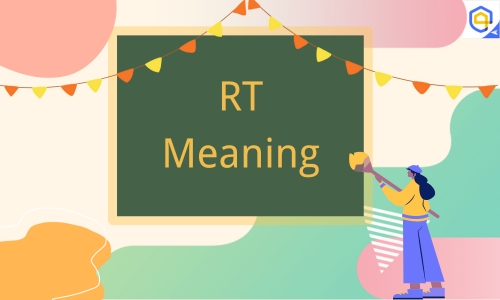
This article aims to shed light on RT's meaning and definition, exploring its different interpretations and usage in various contexts. Whether you are a social media influencer, business owner, or casual texter, understanding the different meanings of RT can help you communicate more efficiently and effectively with your audience.
So, let's delve deeper into what RT signifies in texting and social media.
What Does RT Mean
RT is the widely used acronym in texting, especially in social media. There are several meanings of RT, and some of those meanings and acronyms are explained below:
Retweet
RT commonly stands for retweet. Retweeting is a popular feature of Twitter that allows users to share someone's tweet with their followers. They can add any extra text and share it with their followers.
Sometimes RT is added at the start of any tweet so everyone knows that this tweet does not belong to him; instead, it is created and written by someone else.

Real Talk
Secondly, RT stands for real talk. It means that someone is saying something with honesty. The slang is a short form to convince someone that he is speaking candidly or honestly about such a topic.
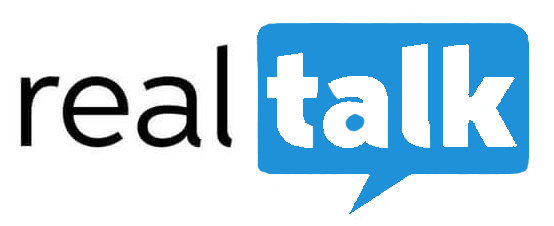
Retyped
Retyped is also an acronym for RT, which means manual forward. It means that the sender of this message has retyped or he retypes some part of it. It also means that the sender does not own the copyright of such text.

Round Table
Lastly, the RT also means the round table. The round table is a meeting or conversation where everyone has the right to participate equally. So, the RT indicates that the meeting will be a round table, and everyone has equal rights to contribute to the meeting.

In summary, RT has different meanings depending on the type of conversation and platform.
Learn More about Retweeting
Retweeting is a common thing on social media. It is one of the most popular features of Twitter, where users can share someone's tweet with their followers. It is done automatically with the help of a button given under every tweet.
The user is given the freedom to add their views to that tweet. For example, if Morgan Freeman shares a thought on Twitter, you want to share the tweet. In this case, you've to push that retweet button given under that tweet, and you'll be given two options. You can either share the tweet as it is or add your thoughts to it. Retweeting mostly occurs on Twitter, but similar features are on all social media platforms.
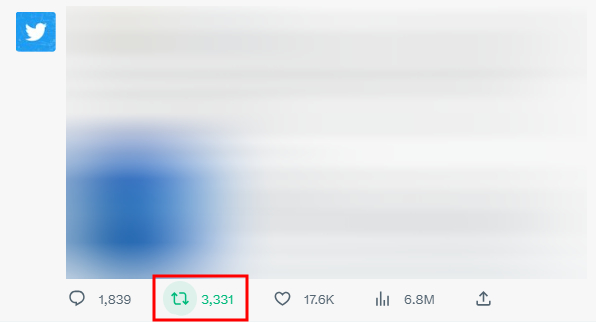
RT Use Examples in Texting
If someone says, "RT this message if you agree," then you should retweet the message (i.e., tweet) if you agree with what he said.
Similarly, if your friend asks, "Can you RT this email for me? I'm in a hurry," your friend asks for help. He is asking you to retype that email.
If there's any discussion, someone suddenly says, "Let's RT this issue tomorrow." It means he's asking for a round table meeting where everyone can help resolve the said issue.
So, now you've observed how the RT meaning and acronym change from one type of message to another. The meaning and acronym of RT only depend upon the type of conversation you are having.
History of RT
The use of RT originally started when Twitter was launched back in 2006. Although it was the start of Twitter, people were unfamiliar with this platform and its acronyms. However, the feature for retweets was available in 2009, and it was abbreviated to RT when social media and texting were sky-high.
The introduction of retweets and smartphones made this abbreviation more common in all generations. With time people started to chat a lot and then used RT for many different meanings. Now RT has many meanings, and it all depends on the tone and type of conversation. It is how RT was modernized from retweeting to real talk and much more.
Other Twitter Slang and Abbreviations
Other slang and abbreviations are also used on Twitter and other social media apps. Similar abbreviations of RT are somehow connected through meaning, platform, and history. Some of this slang and abbreviations are listed and explained below.
RN stands for right now. Twitter offers a limited text (number of characters) for each tweet, so people started using commonly used long words in abbreviations, and RN is one of them.
TTYL is another abbreviation that stands for talk to you later. This abbreviation is also mainly used on Twitter.
QT stands for the quoted tweet, and it is also a Twitter feature where you can add your opinion while retweeting the tweet.
MT stands for the modified tweet, which is used when any previous tweet is being edited or added a few more meanings or dates to the tweet.
ICYMI stands for in case you missed it. The user wants to draw attention to any critical thing viewers might have missed.
Get Notification about Teen Slang like RT
Although using an acronym like RT is not harmful to any age or person, many keywords and acronyms are offensive and should be overlooked by all parents. All parents can install an app on their child's mobile phone so they know what acronym they use and how they interact with each other.
AirDroid Parental Control is one of the best applications for Android phones. AirDroid Parental Control has many features, including getting notifications for specific texting or social media keywords. Some of the most popular features of the application are listed below.
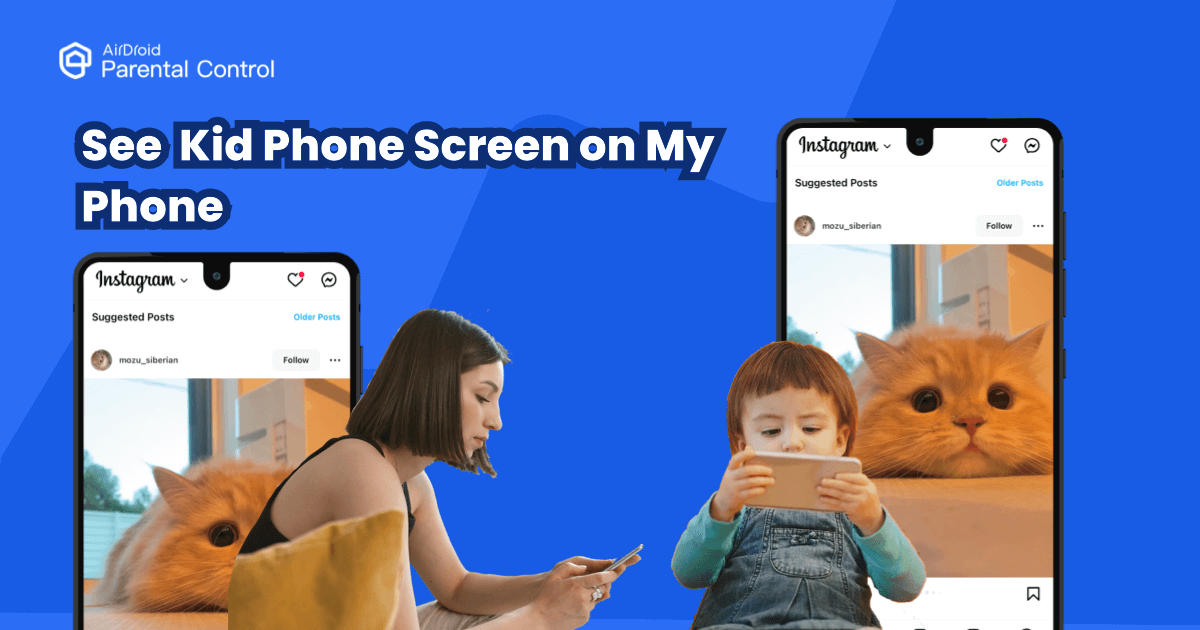
Features
- Monitor Android phone activity by Screen Mirroring and Notifications.
- Block any game or application so that children do not play that game or use that application.
- Limit the screen time for the children so they do not use the phone while they are busy or doing homework.
- Track the location of the child so you can have an eye on your loved ones.
Final Words
In conclusion, there's been a huge spike in the use of social media, which has led to the high use of posting and texting instead of calling. People use acronyms like RT for communication, and many do not understand the meaning of such acronyms.
We have started a series explaining every acronym used in texting and social media posting. The purpose is to educate the parents about the use of such acronyms. So they can understand what is going on in their child's life and they can take protective measures for their child's safety.
The post RT Meaning: A Guide to the Popular Abbreviation first appeared on www.airdroid.com.
]]>The post Based Meaning: Definition, Origin, Use Examples, and More first appeared on www.airdroid.com.
]]>As of now, you may have realized that there are many slang terms out here nowadays. If you are a person that loves going through social platforms, then you will see lots of slang and some you won't even understand what they mean. So, to help with this problem, we will start by defining the Based meaning.
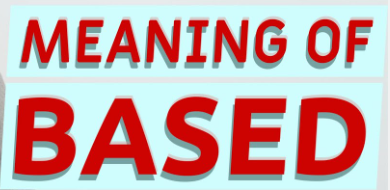
Over the past few years, the popularity of this common online slang word has increased. From meme culture to political discussions, "based" has become a common signifier for various attitudes and behaviours.
But the question is: What does based mean?
Well, in this article, we will help define what based actually mean in different contexts, determine its origin and how it is used in conversations.
So, regardless of your level of online experience or familiarity with the realm of memes, this piece will provide you a thorough explanation of the word based. So, keep reading!
Based Meaning Slang
The term "based" has undergone a significant transformation in recent years. It was initially used to describe someone addicted to crack cocaine or behaving like they were.
Rapper Lil B, however, reclaimed the phrase and gave it a new definition over the previous few years: "to be true to yourself and exude confidence, without worrying about what others think of you."
Nevertheless, in online communities, particularly within the alt-right movement, "based" has been used differently. It has been co-opted as a general term of praise within this group. They've been used to signal a rejection of politically correct attitudes and a celebration of nonconformity.
What Does Base Mean?
The term "based" on the Internet typically means agreement, and social media and forum users commonly use it to express approval or admiration.
The origins of this slang term can be traced back to its popularization by rapper Brandon "Lil B" McCartney, also known as The Based God. However, it has undergone various evolutions throughout its history.
Now with that said, let's see what this term means on social platforms such as TikTok.
What Does Based Mean TikTok?
On TikTok, this term has gained viral popularity. And so, the idea of being unapologetically true to oneself, without being weighed down by concerns of others' perceptions, means based on TikTok.
As noted, this meaning was initially invented by rapper Lil B. This term is meant to convey the message of self-confidence—the ability to carry oneself with swagger, irrespective of external opinions.
Therefore, when you see people, your friend or kids use this term on TikTok, you know what they are referring to.
With based meaning now determined, let's move on to its origin.
What Is Based AF Meaning?
As noted, based can either refer to being cool or addicted to crack cocaine or behaving like one. But was does 'AF' mean?
The acronym AF stands for the slang term 'As Fucked’, which means really or extreme. For example, if I say; I was drunk AF last night, I mean I was really drunk.
And so this same explanation applies to 'based af,' which means being cool or addicted to crack to cocaine.
Remember that based is a term that can be used in different environments like education—for example, merit-based scholarships.
What Is Merit-based Scholarship Mean?
Merit-based scholarships are financial awards given to college students based on their high achievements and accolades. This scholarship can be based on academic or non-academic achievements, such as excellence in:
- Music
- Sports
- Community service
- Leadership
They usually award these scholarships to students who have demonstrated exceptional abilities or accomplishments instead of financial need.
Depending on the company or school giving out the scholarships, different organizations may have different requirements.
The tuition, books, housing and board, and other costs associated with a student's education may fully or in part be covered by merit-based scholarships.
Depending on the student's ongoing academic or extracurricular achievements, they may be renewed for a number of years and offered by schools, private groups, or governmental organizations.
What Is Based Origin?
Based is currently among the most used slang, but where did this term originate?
Well, based is a slang term that originated from "basehead," a term used in the 1980s to refer to individuals addicted to freebasing cocaine, a drug-smoking method. Initially, it referred to individuals who exhibited erratic or abnormal behaviour, particularly in West Coast Street slang.
However, rapper Brandon "Lil B" McCartney redefined the term in the 2000s. According to him, based means "being yourself" and "not being afraid of what others think about you." Lil B adopted the moniker "Based God," and a cosmology of Based God emerged, attributing to him extraordinary powers like the ability to curse basketball player Kevin Durant.
Nonetheless, the term based was later adopted by the alt-right community online in the 2010s as a sign of approval for conservative figures. For example, Christina Hoff Sommers, a conservative commentator, was called "Based Mom" during the Gamergate controversy in 2014. Since then, referring to right-wing conservative figures as based has become a way of signalling approval on online platforms.
Who Used the Term Based?
Based is a term popularized in the hip-hop subculture and is primarily associated with the rapper Lil B. Being based is essentially a way of life that emphasizes having maximum swagger, achieving success, and living a luxurious lifestyle. It's about being true to oneself, having confidence, and doing what one wants without fear of judgment.
And so, who uses this term?
Well, the young generation and people associated with the hip-hop culture commonly use this slang. But since it has become a common theme on TikTok and other social media platforms, it has become widely used by anyone.
How Is Based Used in Conversation?
The slang term 'Based' can be used in several ways in conversation. Here are some common meanings and usage of the word:
1. As an expression of admiration or respect:
In some contexts, 'Based' can express admiration or respect for someone seen as courageous or unapologetically true to themselves. For instance, someone might say, "That rapper is so Based," meaning they appreciate the artist for speaking their mind and being true to themselves.
Other examples include:
- "That athlete is so Based. He never backs down from a challenge."
- "Have you seen that comedian's latest special? It's so Based."
2. As an affirmation or agreement:
This slang term can also be used as a simple affirmation or agreement with what someone is saying. For instance, if someone says something that another person finds particularly insightful, the second person might respond with "Based" as a way of saying "I agree" or "That's right."
Other examples include:
- "I don't understand why people get so offended over everything these days." "Based."
- "People need to stop taking everything so seriously." "Based."
3. As a descriptor of one's worldview:
'Based' can also be used to describe one's general worldview or philosophy. For example, someone might express themselves as 'Based' if they prioritize individualism, free speech, and self-expression over conformity to social norms.
Other examples include:
- "I'm all about free speech and being true to yourself. I guess you could say I'm pretty Based."
- "I don't care about fitting in with the crowd. I'm just trying to live my life in a Based way."
- "I think everyone should be able to express themselves however they want. That's a Based philosophy, in my opinion."
4. As a term of endearment or greeting:
Furthermore, 'Based' can be used as an endearment or greeting among friends.
Other examples include:
- "Hey, Based God! What's up?"
- "What's good, my Based friend?"
- "What's crackin', Based Squad?"
5. As a descriptor of something cool or impressive:
Lastly, 'Based' can describe something cool or impressive. For example, someone might say, "That song is so Based," to express their admiration for the track or to describe its positive qualities.
Other examples include:
- "That new video game is so Based. The graphics are insane."
- "Did you hear that new rapper's album? It's so Based. The beats are sick."
- "That car is so Based. I love the retro look and feel."
6. Someone who is addicted to cocaine
This might not be the typical use case of the base, but it can still refer to someone addicted to cocaine. And so you should also watch out for this.
Other examples include:
- That G is based af
- Stop using that shit, or else you will soon be another based
How Can You Identify If Your Kid Is Using Based Slang Terms?
Based may not seemingly look like a bad word that you should be worried about if your kids happen to use it often. However, if it is being used in the context of drug abuse, then you should be concerned. And so, how can you tell if your kid is using this term?
Well, there are three main ways you can do so:
- Ask your kid: Not effective, but you can get some insights
- Check their mobile devices: Well, this method is much better than the first one and may help you discover if they are using this term. Checking their conversations is an effective way to discover that.
- Use the Parental control app: This is the best way between all these three. A parental control app like AirDroid Parental Control can help you track their conversation anywhere and anytime without them knowing.

Keep in mind that the AirDroid Parental Control app has more benefits besides tracking conversations. For example, this app can help your limit screen time, manage different apps, track locations and more.
Conclusion
To wrap it up, it is essential to note that based meaning is founded on the context in which this slang term is used. Therefore, it is crucial to know all the potential meanings and use cases of based to learn how to use them.
The post Based Meaning: Definition, Origin, Use Examples, and More first appeared on www.airdroid.com.
]]>The post The Secret Language of Texting: What Does 143 Really Mean first appeared on www.airdroid.com.
]]>With the rise of smartphone technology and social media, parents need to be aware of a new world of communication. One popular form of communication among teenagers is texting. But what does all this abbreviated language mean? This blog post will decode some of the most popular text lingos and explain what 143 means.

What Does 143 Mean in Texting Lingo
143 means "I love you." Back in the 90s when pagers were widely used, 143 was a quick way of saying it. Each number of 143 just counts the letters in each word: I (1), Love (4), You (3).
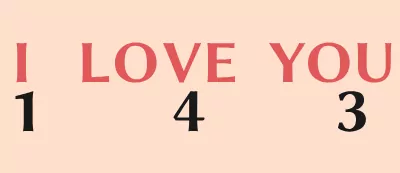
But do you know when it first became significant in our digital world? The answer will certainly surprise you!
Back in 1894, the Lighthouse Board's Lt. Frederick Mahan recommended that all lighthouses be equipped with a numerical flash sequence to improve navigability and safety at sea.
Consequently, Minots Ledge Light installed such a lantern which displayed 1-4-3 flashes - for reasons unknown. It was also an expensive endeavor, thus, making Minots Ledge Light only one of two lighthouses with this feature out of many across the seaside landscape! And so began our beloved association between "143" and "I Love You."

Fascinatingly, this iconic flash sequence continues to be used today and is often referred to as "light language," with 1-4-3 serving as a Morse code for "I Love You" in the same vein that other abbreviations such as LOL (laugh out loud) or BRB (be right back).
Why Do Teens Use 143
Children have adopted this numeric phrase to express their feelings of love to peers, family, and partners. With the fast pace of the digital age, teens always look for new and creative shortcuts to express themselves. Texting codes like 143 help them do this while making their conversations more efficient. There are many numbers with the meaning, like 143.
Regarding secret codes, just like adults, kids use secret codes primarily through text messaging. Still, you can also use them in other ways. Parents should learn secret codes such as "831", which stands for "I Love You Forever," or maybe "420", which means, laughingly enough, an invitation for marijuana use.
Other Common Abbreviations Parents Should Know
As a parent, navigating internet slang can be difficult. Your average teenager is probably an expert on all abbreviations. They don't count as real words! Knowing abbreviations can facilitate communication between parents and children and ensure internet safety.
Common acronyms include TBH (to be honest), BRB (be right back), SMH (shaking my head), FTW (for the win), and ASL (age/sex/location). You don't need to be an internet savant to understand basic internet lingo: with a short refresher now and then, parents can ensure that internet conversations with their kids are productive. However, not all abbreviations have as innocent meanings as "LOL," which stands for laugh out loud! So brush up on your knowledge and ensure your kids communicate responsibly online.
Regarding secret codes, just like adults, kids use secret codes primarily through text messaging. Still, you can also use them in other ways. Parents should learn secret codes such as "831", which stands for "I Love You Forever," or maybe "420", which means, laughingly enough, an invitation for marijuana use.
Some code words may be innocent, but others can be more serious. For example, "GNOC" stands for "Get Naked On Camera." If you find "CU46" among your child's messages, which stands for "see you for sex.", this means time for you to sit down and talk seriously with your child. Another code word you might be wary of is the innocent number "8", which stands for "oral sex." Shocking, right?
Keeping up with secret codes can help parents better understand their kids and help them stay on top of their conversations. It's important to remember that secret codes aren't always maliciously implemented, in any case! They can also be a fun way for friends and cousins to craft secret messages with each other. As long as your kid uses secret codes responsibly and does not engage in risky behavior, there's nothing to worry about!
Reasons Parents Should Be Concerned about the Code Words Kids Use When Texting
Texting has become one of the main ways that kids and teens communicate, both on their own and with adults. However, as internet slang or code words become more widely used, concerned parents should know what they mean. These code words are often innocent enough; they are just a shorthand way to talk quickly with others who know what they mean.
While some of it can be innocent enough, parents should be mindful that their children could be exchanging inappropriate or explicit content with each other that may seem innocent to them due to the use of internet slang. Parents should pay close attention to code words their kids use when texting, as it could put them in a vulnerable position.
Therefore, parents need to be involved in their kids' conversations and ensure they understand the internet language being used - without coming across as overbearing or intrusive.
Knowing what code words and internet slang their kids use when texting can provide insight into their children's conversations and help identify potential risky behavior from them or any peers they associate with online. Having a conversation with your kid about internet slang is important, too; understanding it can also help ensure that potentially difficult conversations are identified if they arise.
How to Properly Monitor and Control Your Child's Text Messages
With the increasing popularity of texting among children and teens, parents need to understand how to properly monitor their child's text messages without being intrusive. The first step is to agree with your child on what types of conversations are acceptable and which ones aren't. It could involve talking to them about the importance of not sharing personal information or explicit content over text messages.
Parents should also discuss online safety rules, including whom they can talk to and when too much texting could become an issue. Set an agreement with your children about when it's okay to use their device and what type of content is acceptable. It's also important to set boundaries around text monitoring.
Additionally, you can set up parental controls on your child's mobile device that let you control what they can access online and block inappropriate websites. Parental control apps are an effective way to help keep your kids safe online. These types of apps can be used to monitor and control the websites your child visits, limit their screen time, block inappropriate content, set up alerts if there is any suspicious activity, and even track the location of their device.
It is where AirDroid Parental Control can help. It offers a range of features that allow parents to easily monitor their child's online activities, set up alerts if there is any suspicious activity, and even track the location of their device. With its intuitive interface and easy-to-use controls, AirDroid Parental Control is the perfect tool for keeping kids safe online. Using the AirDroid app, you can easily monitor your kids' text messages and set up notifications of text messages to stop suicide, cyberbullying, etc.

It can also block inappropriate apps like violent games, porn websites, gambling sites, etc. Moreover, you can set up alerts for suspicious activity, like someone trying to access private data or sharing inappropriate content.
You can monitor text messages your kids send or receive and view whom they communicate with and when each conversation happens, including its content.
In addition to this monitoring feature of AirDroid, other capabilities include blocking certain contacts from contacting them and setting screen time limits - all of which can help protect them from unwanted danger or dangerous people online while also ensuring responsible phone usage for their young minds!
Wrapping Up
Parents must know about texting slang to understand their kids and keep them safe. We've explained 143 and other popular acronyms and advice for monitoring your children's online lives. Signing up for the AirDroid Parental Control app is an easy way to track your children's online activities.
With this Android-based app, you can monitor their text messaging activity, view browser history, set up apps that prevent the use of inappropriate content, and more. With the aid of this powerful tool, you can help protect your children from harm while giving them the freedom to express themselves confidently. Get started on a safer digital world today by downloading the AirDroid Parental Control app!
The post The Secret Language of Texting: What Does 143 Really Mean first appeared on www.airdroid.com.
]]>